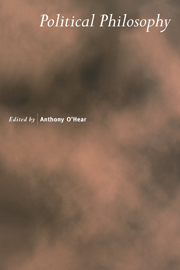Book contents
- Frontmatter
- Contents
- Preface
- Notes on Contributors
- Making the World Safe for Utilitarianism
- Innocent Before God: Politics, Morality and the Case of Billy Budd
- Democracy and Openness
- Rights and Human Rights
- Prerogative to Depart from Equality
- Casting the First Stone: Who Can, and Who Can't, Condemn the Terrorists?
- Against Egalitarianism
- Big Decision: Opting, Converting, Drifing
- The Epistemology of Unjust War
- High Culture, Low Politics
- Edmund Burke and the Anglo-American Tradition of Liberty
- The Politics of Emotion: Liberalism and Cognitivism
- Index of Names
Democracy and Openness
Published online by Cambridge University Press: 04 August 2010
- Frontmatter
- Contents
- Preface
- Notes on Contributors
- Making the World Safe for Utilitarianism
- Innocent Before God: Politics, Morality and the Case of Billy Budd
- Democracy and Openness
- Rights and Human Rights
- Prerogative to Depart from Equality
- Casting the First Stone: Who Can, and Who Can't, Condemn the Terrorists?
- Against Egalitarianism
- Big Decision: Opting, Converting, Drifing
- The Epistemology of Unjust War
- High Culture, Low Politics
- Edmund Burke and the Anglo-American Tradition of Liberty
- The Politics of Emotion: Liberalism and Cognitivism
- Index of Names
Summary
During the recent Iraq war there was a great deal of discussion of the desirability of bringing democracy to Iraq, and indeed to other countries which were suffering under ruthless and oppressive dictatorships. There was also the thought that if Iraq had a flourishing democratic system, its benefits would become evident within the Middle East, and other peoples in the area would be encouraged to press for more democracy in their own countries. And critics who expressed doubts about any of this were accused of treating the people of the Middle East in a patronising way, implying that they were not able to do what we in the West have managed for some time.
I certainly do not want to appear patronising, nor indeed do I want to reject the idea that democracy may be the best form of government for everyone, everywhere. And I think that it evinces a form of pessimistic determinism to say, as many do on both left and right, that there may be countries too poor or backward to become democracies. But I do want to raise a number of questions in order to make slightly more precise just what might be meant by democracy, or by the sort of democracy it might be advisable to spread around the world.
- Type
- Chapter
- Information
- Political Philosophy , pp. 39 - 56Publisher: Cambridge University PressPrint publication year: 2007

